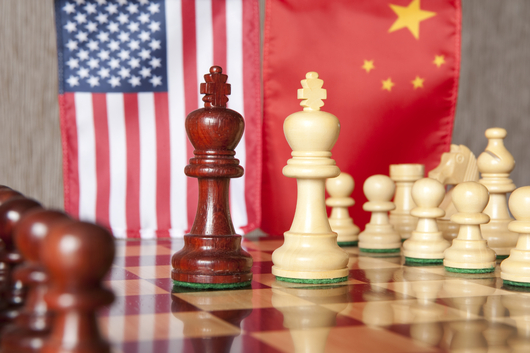China’s foreign policy is clouded by uncertainty. For Beijing, its most important foreign relations are those with the United States and its Asian neighbors. Yet, the two relationships are locked into maritime competition and disputes. Looking ahead, China will find strategic competition and confrontation primarily in its coastal waters and the western Pacific. Beijing’s “Thucydides' trap” will be on the sea, not on land.
Let us first examine the essential features of the China-US relationship. It is important to keep in mind the following fundamental facts: As globalization deepens and geopolitical wrestling resurfaces, the relationship is more multi-faceted, complex, dynamic and significant than it has ever been – after all, the one is the largest developing country enjoying robust economic growth to the west of the Pacific and the other is the most powerful and influential developed nation on the eastern shore of the same ocean.
As things stand now, China and the United States are neither rivals nor partners in an ordinary sense. Their relationship has elements of competition and antagonism as well as coordination and collaboration, and things are in flux. Both sides need to understand the risks of potential pitfall and consequential damage should they let each other feel slighted, or misread each other’s major policies, vital interests, actual capability or basic orientation as a result of either misunderstanding or preconception. It would be political miscalculation and strategic folly for either side to adopt the heavy-handed tactic of trying to subdue the other through coercion or for the other to overreact in a blunt or rash fashion.
Given the circumstances, what is China’s best strategy vis-à-vis the United States? As I see it, Beijing must act firmly and yet prudently to press Washington to accept its strategic rights; ultimately, leading over a period of time to a mutual, peaceful accommodation between the world’s two preeminent powers. In some circumstances, it is necessary to be firm; in other situations, prudence must be the preferred approach. As Chairman Mao used to remind us, neither inclination should override or exclude the other inclination. The current Chinese leadership would do well to both act proactively to “seize the day, seize the hour” and at the same time see the pitfall of “more haste, less speed.”
Beijing’s relationship with Washington is inextricably tied to its own neighborhood. The simple truth is that China cannot get its US relationship right without sorting out relations with its neighbors. A survey of the particularly negative stretches and dimensions of the China-US relationship points to China’s regional neighbors as the source of friction or trouble. Beijing and Washington quite obviously see their interests differently and Washington has, in Beijing’s view, acted to incite, exploit and escalate these structural frictions and competition. Hence, to arrive at the long-term, strategic accommodation I mentioned earlier, by persuasion or by compulsion, China must win over more friends and strategic partners in it’s the Asia-Pacific or at least encourage them to be impartial players. At the same time, Beijing must “neutralize” those neighbors that are its adversaries or Washington’s appendages.
In the wake of the Central Neighborhood Diplomacy Conference last October, the Chinese government has been more creative, practical and effective in key areas of its neighborhood diplomacy. However, due to the more diverse goals China is pursuing in its neighborhood and the increasingly complex international environment, the standoff with Japan and the Philippines has worsened instead of eased. The maritime dispute with Vietnam, which had been de-escalated and frozen for a couple of months, took a bad turn. This situation was compounded by sharp rhetoric and provocative actions from Washington concerning the South China Sea following Beijing’s announcement of an Air Defense Identification Zone (ADIZ) in the East China Sea.
And this was not all. The geopolitically and strategically important China-DPRK relations are at an all-time low. Possibilities of competition and coordination have both grown between Beijing and New Delhi after Narendra Modi’s crushing electoral victory. Washington and Tokyo have gone to considerable lengths to woo India’s new government and enlist it as a partner in containing China’s rise. Prime Minister Modi has seemed to play along, raising the geopolitical stakes and complicating the picture for Beijing.
So the bottom line is: China is playing a high-stakes game with both its neighbors and the United States. While it is important to stay the course, some fresh thinking is also called for.
This should begin with a frank reassessment of China’s foreign policy priorities. Even though China’s diplomatic interests now span the globe, it is important not to spread its resources thin and instead focus on the relationships that really matter.
Here, Carl von Clausewitz’s On War is particularly relevant. China could learn a thing or two from him to effect the necessary readjustment of its policy toward the United States and its neighbors:
“From a variety of facts and circumstances, it is important to identify the most pressing and important factor and distinguish it from the less pressing and important ones. … To determine what amount of our resources need to be mobilized for the purpose of war, we must first examine the political goals of the enemy as well as ourselves. We must have a good assessment of the strength of the enemy and the character and ability of its government and people, and do the same to ourselves. Lastly, we must evaluate the political inclinations of other countries and the impact the impending war may have on them. It is a gigantic task to conduct these assessments in all respects and dimensions.”
In other words, the key principle is “calculated moderation” that serves China’s grand goal.


